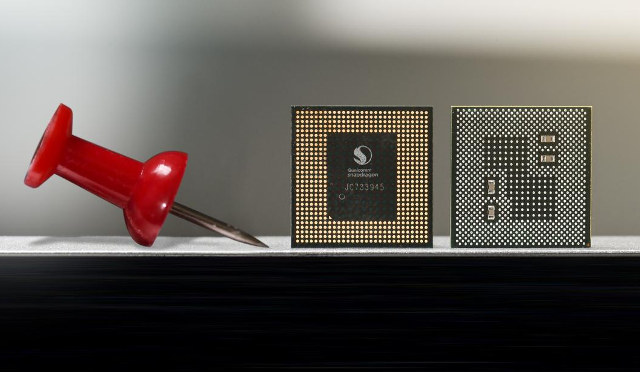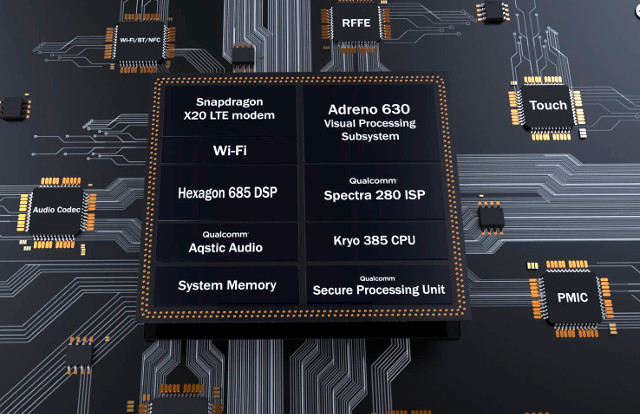Qualcomm Snapdragon 845 processor was expected since May 2017 with four custom Cortex A75 cores, four Cortex A53 cores, Adreno 630 GPU, and X20 LTE modem. with the launch planned for Q1 2018. At least, that what the leaks said.
Qualcomm has now formally launched Snapdragon 845 Mobile Platform and rumors were mostly right, as the the octa-core processor comes with four Kryo 385 Gold cores (custom Cortex A75), four Kryo 385 Silver cores (custom Cortex A55) leveraging DynamIQ technology, an Adreno 630 “Visual Processing System”, and Snapdragon X20 modem supporting LTE Cat18/13.
The processor is said to use more advanced artificial intelligence (AI) allowing what the company calls “extended reality (XR)” applications, and will soon be found in flagship smartphones, XR headsets, mobile PCs, and more.
Qualcomm Snapdragon 845 (SDM845) specifications:
- Processor
- 4x Kryo 385 Gold performance cores @ up to 2.80 GHz (custom ARM Cortex A75 cores)
- 4x Kryo 385 Silver efficiency cores @ up to 1.80 GHz (custom ARM Cortex A55 cores)
- DynamIQ technology
- GPU (Visual Processing Subsystem) – Adreno 630 supporting OpenGL ES 3.2, OpenCL 2.0,Vulkan 1.x, DxNext
- DSP
- Hexagon 685 with 3rd Gen Vector Extensions, Qualcomm All-Ways Aware Sensor Hub.
- Supports Snapdragon Neural Processing Engine (NPE) SDK, Caffe, Caffe2, and Tensorflow
- Memory I/F – LPDDR4x, 4×16 bit up to 1866MHz, 8GB RAM
- Storage I/F – TBD (Likely UFS 2.1, but maybe UFS 3.0?)
- Display
- Up to 4K Ultra HD, 60 FPS, or dual 2400×2400 @ 120 FPS (VR); 10-bit color depth
- DisplayPort and USB Type-C support
- Audio
- Qualcomm Aqstic audio codec and speaker amplifier
- Qualcomm aptX audio playback with support for aptX Classic and HD
- Native DSD support, PCM up to 384kHz/32bit
- Camera
- Spectra 280 ISP with dual 14-bit ISPs
- Up to 16 MP dual camera, up to 32 MP single camera
- Support for 16MP image sensor operating up to 60 frames per second
- Hybrid Autofocus, Zero Shutter Lag, Multi-frame Noise Reduction (MFNR)
- Video Capture – Up to 4K @ 60fps HDR (H.265), up to 720p @ 480fps (slow motion)
- Connectivity
- Cellular Modem – Snapdragon X20 with peak download speed: 1.2 Gbps (LTE Cat 18), peak upload speed: 150 Mbps (LTE Cat 13)
- Qualcomm Wi-Fi 802.11ad Multi-gigabit, integrated 802.11ac 2×2 with MU-MIMO, 2.4 GHz, 5 GHz and 60 GHz
- Qualcomm TrueWireless Bluetooth 5
- Location – Support for 6 satellite systems: GPS, GLONASS, Beidou, Galileo, QZSS, SBAS; low power geofencing and tracking, sensor-assisted navigation
- Security – Qualcomm Secure Processing Unit (SPU), Qualcomm Processor Security, Qualcomm Mobile Security, Qualcomm Content Protection
- Charging – Qualcomm Quick Charge 4/4+ technology
- Process – 10nm LPP
The company will provide support for Android and Windows operating systems. eXtended Reality (XR) is enabled with features such as room-scale 6DoF with simultaneous localization and mapping (SLAM), advanced visual inertial odometry (VIO), and Adreno Foveation. Maybe I don’t follow the phone market closely enough, but I can’t remember seeing odometry implemented in any other phones, and Adreon Foveation is not quite self-explaining, so the company explains it combines graphics rendering with eye tracking, and directs the highest graphics resources to where you’re physically looking, while using less resources for rendering other areas. This improves the experience, performance, and lower power consumption.

Compared to Snapdragon 835, the new processor is said to be around 25 to 30% faster, the Spectra camera and Adreno graphics architectures are claimed to boost power efficiency by up to 30 percent, and the LTE modem is a bit faster (1.2 Gbps/150Mbps vs 1.0 Gbps/150Mbps). Quick Charge 4+ technology should deliver up to 50 percent charge in 15 minutes. Earlier this year when SD835 was officially launched, there was virtually no mention of artificial intelligence support in mobile APs, but now NNA (Neural Network Accelerator) or NPE (Neural Processing Engine) are part of most high-end mobile processors, which in SD845 appears to be done though the Hexagon 685 DSP. High Dynamic Range (HDR) for video playback and capture is also a novelty in the new Snapdragon processor.
One of the first device powered by Snapdragon 845 will be Xiaomi Mi 7 smartphone, and according to leaks it will come with a 6.1″ display, up to 8GB RAM, dual camera, 3D facial recognition, and more. Further details about the phone are expected for Mobile World Congress 2018. Considering the first Windows 10 laptop based on Snapdragon 835 processor are expected in H1 2018, we may have to wait until the second part of the year for the launch of Snapdragon 845 mobile PCs.
More details may be found on Qualcomm Snapdragon 845 mobile platform product page.

Jean-Luc started CNX Software in 2010 as a part-time endeavor, before quitting his job as a software engineering manager, and starting to write daily news, and reviews full time later in 2011.
Support CNX Software! Donate via cryptocurrencies, become a Patron on Patreon, or purchase goods on Amazon or Aliexpress. We also use affiliate links in articles to earn commissions if you make a purchase after clicking on those links.






it will be interesting to compare the performance of the SD845 agains the Apple Bionic A11 series.
Windows 10 laptops with this part are far too expensive (e.g. HP Envy at $600-$800). You cannot run x86-64 bit applications on this chip. (Micro$oft claims you MAY be able to run x86-64 bit programs in the future though.) It looks like Microsoft is pushing its crippled Windows 10S version hard on this platform, but there are rumors that you can upgrade to regular windows 10, but only for a limited time. First benchmarks look lousy:
https://www.gizmochina.com/2017/11/13/windows-10-arm-notebooks-geekbench-scores-hp-launching-12-notebook-8gb-ram-256gb-storage/
Bad performance is to be expected though, remember this an x86-32 bit CISC device being EMULATED on ARM RISC(ish) hardware. If and when Micro$oft lets you run 64-bit programs on these ARM devices, expect performance to drop further.
I think there is a bright future for this ARM approach given the potential for longer battery life. But it is still early days and there is great risk that Micro$oft will once again get greedy and shoot itself in the foot.
@Drone
Microsoft have no issue emulating x86-64. Intel do. And the upgrade to win10pro was not rumored — it was officially announced (yes, it’s free for a limited time).
@blu
who’s the owner of the x86_64 instructions set rights ? isn’t it AMD ?
I once read in a french site that qualcomm/microsoft only emulated x86 because it’s in “public domain” (not sure it’s the right translation, i mean intel can’t sue them anymore because it’s too old).
But x86_64 isn’t yet, so they have to wait a few more years.
What do these Geekbench numbers tell? Are you able to interpret them and explain?
@nobe
To the best of my knowledge, x86-64 / amd64 is owned jointly by AMD and Intel via a cross-licensing agreement. And what you read is correct — x86 circa ppro is not protected by any intellectual property laws due to expiration. That’s why Qcomm and MS (or anybody) can freely emulate x86 circa ppro while Intel watch from the side, holding lawyers on steady, waiting to catch some ‘newer’ instruction in the emulation. In the meantime, 2019 is when KNI (p3) ISA intellectual property expires, and that effectively covers virtually everything pre-amd64 ISA-wise. So ironically, Intel’s model of clinging to ISA backward compatibility indefinitely is working against their own interest in this case.
@nobe
Based on what I read today to me it seems the problems is not a legal one but how Microsoft implemented the binary translation to jump in: as part of WoW (Windows on Windows) and with 64-bit code this is not possible since different execution mode (applies to 64-bit installers for 32-bit software too BTW).
But I don’t think this is a huge problem since for Microsoft this whole binary translation thing is there only to avoid a chicken-egg problem and make a transition happen (if Microsoft does not screw up their ARM offers this time soon then getting developers to recompile their stuff for ARM too). If experiences with other platforms count we could look at Apple: they licensed Transitive’s binary translation technology starting with OS X 10.4 and ended with 10.6 (2006-2009). Afterwards the transition from PowerPC to Intel was almost done (though a lot of people still running 10.6 inside virtual machines to keep older PowerPC software running).
@tkaiser
The numbers remind me of what I’ve seen with Celeron level parts.
But why do you care about numbers without meaning? Those Geekbench generated numbers are irrelevant since the test procedure is not testing what’s happening in reality especially in this case. Or can you explain why a benchmark decompressing JPEG streams on a CPU core (how stupid is this in 2017?) measuring the performance of a dynamic binary translation people call ’emulation’ should matter? If images are decoded instantly and natively and not on the CPU cores anyway?
Why do people do not benchmark the benchmark first but blindly trust in stupid numbers? Most probably since it seems easier to compare a set of numbers than thinking about the relevance of these numbers?